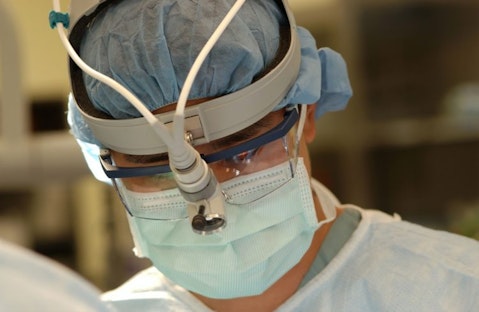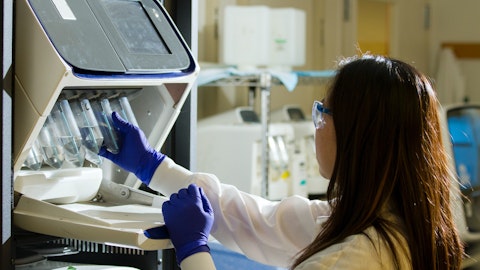Medtronic plc (NYSE:MDT) Q3 2023 Earnings Call Transcript February 21, 2023
Ryan Weispfenning: Good morning. I am Ryan Weispfenning, Vice President and Head of Medtronic Investor Relations. Welcome to Minnesota where signs of spring are in the air. I appreciate that you are joining us today for Medtronic’s Fiscal 2023 Third Quarter Earnings Video Webcast. Before we go inside to hear our prepared remarks, I will share a few details about today’s webcast. Joining me are Geoff Martha, Medtronic Chairman and Chief Executive Officer; and Karen Parkhill, Medtronic Chief Financial Officer. Geoff and Karen will provide comments on the results of our third quarter, which ended on January 27, 2023 as well as our outlook for the remainder of the fiscal year. After our prepared remarks, the Executive VPs from each of our four segments will join us.
And we will take questions from the sell-side analysts that cover the company. Today’s program should last about an hour. Earlier this morning, we issued a press release containing our financial statements and divisional and geographic revenue summaries. We also posted an earnings presentation that provides additional details on our performance. The presentation can be accessed in our earnings press release or on our website at investorrelations.medtronic.com. During today’s program, many of the statements we make maybe considered forward-looking statements and actual results may differ materially from those projected in any forward-looking statement. Additional information concerning factors to cause actual results to differ is contained in our periodic reports and other filings that we make with the SEC and we do not undertake to update any forward-looking statement.
Unless we say otherwise, all comparisons are on a year-over-year basis and revenue comparisons are made on an organic basis, which excludes the impact of foreign currency and revenue from our Q1 acquisition of Intersect ENT. References to sequential revenue changes compared to the second quarter of fiscal €˜23 and are made on an as-reported basis and all references to share gains or losses refer to revenue share in the fourth calendar quarter of 2022 compared to the fourth calendar quarter of 2021, unless otherwise stated. Reconciliations of all non-GAAP financial measures can be found in our earnings press release or on our website at investorrelations.medtronic.com. And finally, our EPS guidance does not include any charges or gains that would be reported as non-GAAP adjustments to earnings during the fiscal year.
With that, let’s head into the studio and hear about the quarter.
Geoff Martha: Hello, everyone and thank you for joining us today. We reported our Q3 results this morning and we executed to deliver a top and a bottom line that were ahead of our guidance and Street expectations. We are urgently forging the path to durable growth and there are many proof points of our progress in these results. Our cardiovascular and our neuroscience portfolios had strong high single-digit organic growth as we launch new products and demonstrated continued strength in our established market leading cardiac rhythm management and spine franchises. And at the same time, some of the recent revenue headwinds that have held back our growth are subsiding, including product availability in businesses like surgical innovations, cardiac diagnostics, aortic and ENT.
The aggressive transformation at Medtronic is advancing. We are focused on reducing complexity, enhancing our culture, improving capital allocation and portfolio management and upgrading our global manufacturing operations and supply chain capabilities. At the same time, we are progressing on our plans for significant cost reductions. These are aimed at partially mitigating the continued impacts from macro conditions such as inflation and effects on our profitability and cash flow. These cost reductions also create room on our P&L so that we can increase our growth investments and I am very encouraged by the rebound in our revenue growth despite procedure volumes remaining a little softer in a few markets and volume-based procurement in China.
We are confident in delivering durable revenue growth over the coming quarters as recent revenue headwinds continue to dissipate and we execute across our businesses. So, let’s take a closer look at our Q3 results. As I highlighted at an investor conference last month, we are thinking about our portfolio of businesses in three groups: highest growth, synergistic and established market leaders. So I will start with our established market leaders, a group of our largest businesses that make up about half of our revenue. Both our cardiac rhythm and spine businesses had really good quarters, growing 8% and 5% respectively. In CRM, we continue to see strong market adoption of our micro-leadless pacemakers, which grew 14% and our Defibrillation Solutions business grew 7% as replacement headwinds are moderating.
And just last week, we received CE Mark for our Aurora Extravascular ICD. In Cranial & Spinal Technologies, we delivered another strong quarter, with 6% growth in Core Spine, including 12% growth in the United States and 8% growth in Neurosurgery. This is driven by our market leading ecosystem of Aible-enabling technology and the associated pull-through of our best-in-class spinal implants. From our AI-enabled surgical planning platform to our patient-specific and differentiated spine implants, to our imaging our navigation and robotic technologies, we are differentiating ourselves with spine surgeons around the world. Turning to our Surgical Innovations business, SI grew sequentially as we made solid progress recapturing the share that we lost due to supply challenges over the last three quarters.
Year-over-year, SI declined as a result of expected stapling VBP tenders in China. But excluding China sales, SI grew 5% in Q3. Look, surgeons around the world prefer our advanced surgical products and we expect the momentum we are seeing in SI to continue. In particular, in our leading advanced energy franchise, we are seeing strong adoption of our recently launched cordless Sonicision 7 and we are preparing to launch our recently approved LigaSure XP. So we are on the right path with our established market leader businesses. And at the same time, we are advancing our position in high secular growth med tech markets. These businesses are contributing about 20% of our revenue today and collectively growing above our company average. We are investing disproportionately in these businesses and expect them to become an even bigger part of our growth over time.
So starting with Structural Heart, while the TAVR market continued to be impacted by healthcare staffing challenges and COVID in Japan, we drove 11% growth in Q3, including 12% growth in the United States. We are seeing great physician reception for our Evolut FX system, which just completed its full quarter of launch in the U.S. Evolut FX combines industry leading durability with enhanced and predictable valve deployment. And in addition, data was presented during the quarter at PCR London Valves, showing Evolut FX’s Commissure alignment has improved significantly, which is important for coronary access and valve hemodynamics. Now looking ahead, we will continue to bring Evolut FX around the world and we are currently seeking approval in the Japanese and European markets.
In cardiac ablation solutions, we grew 3% globally as provincial China VBP tenders weighed on our results. Outside of China, CAS grew in the high single-digits, including low double-digit growth in the United States on the continued strong adoption of our leading Arctic Front cryoablation technology. We are also advancing what we believe will become the leading pulsed field ablation portfolio. And in 2 weeks, highly anticipated data for our PULSED AF pivotal trial will be released in the late-breaker session at ACC. The trial is evaluating our PULSE Select PFA catheter in both paroxysmal and persistent patients and this will be the first results from an IDE trial in the PFA space and we are on track to be one of the first companies with a PFA catheter in the U.S. market.
We also continue to make progress on bringing our Affera mapping and navigation platform and Sphere-9 catheter to the market as we completed enrollment in our pivotal trial during the quarter. Sphere-9 can perform high-density mapping and deliver either PFA or RF energy, all from the same catheter. And given Sphere-9 is a focal point PFA catheter, it is highly complementary to our PULSE Select anatomical PFA catheter. Finally, our CAS business just launched the AcQCross transseptal access system with a zero exchange workflow and the only system approved for both mechanical and RF crossings. So when you think about our Arctic Front crysolution, our DiamondTemp RF catheter, our PFA catheters, our left heart access solutions and our Affera map nav system, we are assembling a leading ecosystem of technologies to meaningfully increase our participation in the fast growth 8 billion EP ablation space.
In Surgical Robotics, we are making good progress as the second major player in this exciting space. We continue to see positive sales momentum with the rollout of our differentiated Hugo robotic system in many international markets and we started our U.S. IDE trial for our urology indication during the quarter. Given less than 5% of surgical procedures globally are done robotically, we expect our surgical robotics business to become a meaningful growth driver for Medtronic. In Neurovascular, we grew 9% and would have grown a couple of points more, if not for the China VBP. We continue to see very strong growth in several categories, including flow diversion, aspiration and stent retrievers. Given stroke is the number two cause of death globally and there is still very low therapy penetration, we see a long runway for high growth in this market that is approaching $4 billion.
And in Diabetes, we continue to see strong international growth offset by declines in the U.S. where we lack our latest products. We remain focused on resolving our FDA warning letter and are ready for reinspection. We also remain in active review with the FDA on our submission of the MiniMed 780G system with the Guardian 4 sensor. Outside the U.S., our Diabetes business grew 18% on continued strong sales momentum of 780G and Guardian 4. The 780G is now launched in over 90 countries, up from 60 last quarter. We are seeing strong CGM attachment rates, which drove CGM growth up 34% outside the U.S. We continue to invest heavily in assembling our ecosystem of durable pumps, smart pens, patch pumps, sensors, algorithms and customer service with multiple programs under development, all with the intent of restoring strong growth of our important diabetes franchise over the coming years.
And in our synergistic businesses, we also had strong performances across several businesses. We grew double-digits in Cardiac Diagnostics as we ramped up production of LINQ II. In Neuromodulation, we grew 12% in pain stim and the market continues to recover. And our GI business grew high single digits on strong adoption of GI Genius, which uses artificial intelligence to help physicians detect polyps during colonoscopies. With that, I’ll turn it over to Karen to discuss our third quarter financial performance and our guidance. Karen?
Karen Parkhill: Thank you, Geoff. Our third quarter organic revenue increased 4.1%, exceeding our guidance and representing a significant acceleration from our first half results as we begin to put the acute supply chain challenges behind us. Our non-GAAP EPS of $1.30 landed above our guidance by $0.03 on higher revenue growth and increased interest income, and $0.06 if we take into account a larger currency headwind than expected at the beginning of the quarter. Looking at our revenue from a geographic perspective, U.S. grew 2%, and our non-U.S. developed markets increased 6%, even with a 3% decline in Japan as COVID affected procedure volumes. Excluding Japan, non-U.S. developed markets increased 8%. Emerging markets grew 5%, impacted by an 8% decline in China from COVID and VBP provincial tenders in stapling, cardiac ablation and neurovascular.
Outside of China, emerging markets actually grew 17%. I would also note that China represented a 110 basis point headwind on our total company growth, which highlights the strength of the recovery in our other markets. VBP has affected us more than many of our competitors, given the size and breadth of our business in China. However, we do expect that we are now through the majority of the impact. Our adjusted gross margin declined in the quarter as we faced impacts from inflation and currency with currency driving about third of the change. These declines were expected and a result of inflationary pressures that occurred two to three quarters ago. Our incurred manufacturing variances have continued to be significant in the past few quarters.
And as they roll off our balance sheet on to our P&L, we expect continued gross margin pressure in Q4 and next year. The gross margin impact translated into a decline in our adjusted operating margin as well, although this was partially muted by expense control and the benefit of our currency hedging program. Our balance sheet remains strong and we continue to execute our enhanced capital allocation and portfolio management work, balancing future growth investments with returning a minimum of 50% of our free cash flow to shareholders, primarily in the form of our dividend. We see strong opportunities for organic growth investments internally, leading us to target R&D growth at or above revenue growth. And we continue to focus on supplementing our organic investments with tuck-in acquisitions.
We’ve also announced this fiscal year three businesses we intend to separate that account for about 8% of our revenue. And we’re making progress towards completing those transactions. We expect to close our Renal Care joint venture with DaVita here in the fourth quarter, and continue to progress with the separation of our patient monitoring and respiratory interventions businesses, which we expect to occur sometime in the second half of next fiscal year. We have also closed on acquisitions that will contribute to our growth in the years ahead, including Affera, which expands our presence in cardiac ablation, and Intersect ENT, which adds unique sinus implants to our ENT portfolio. We have driven these moves to not only focus and streamline our portfolio, but also to improve our weighted average market growth rate over time.
Now turning to our guidance. Given our top and bottom line beat in the third quarter, we are raising our full year revenue growth and EPS outlook. On the top line, we expect our fourth quarter organic revenue growth to be in the range of 4.5% to 5%, which is unchanged from what was implied by our second half guidance that I gave last quarter. I would note that our organic growth guidance excludes the impact of currency and revenue from our Intersect ENT acquisition. And it also now excludes revenue from our Renal Care Solutions business as we expect the separation to occur during the fourth quarter. If recent exchange rates hold, foreign currency would have a negative impact on our fourth quarter revenue of $165 million to $215 million. Taking into account currency, Intersect ENT revenue and the partial quarter of Renal Care Solutions revenue, our guidance would imply reported revenue in the range of $8.2 billion to $8.3 billion.
We are also maintaining the fourth quarter revenue growth segment expectations that were implied by the back half guidance I gave last quarter. We continue to expect Cardiovascular to be up 5.5% to 6%, Medical Surgical to grow 2.5% to 3%, neuroscience to increase 6.5% to 7% and Diabetes to decline in the low single digits, all on an organic basis. On the bottom line, we continue to drive significant expense reductions to partially offset the impact of inflation and foreign currency. Given our third quarter $0.03 beat, we raised the lower end of our fiscal €˜23 non-GAAP diluted EPS guidance by $0.03 to the new range of $5.28 to $5.30, including an unfavorable currency impact of approximately $0.21 at recent rates. For the fourth quarter, we expect non-GAAP diluted EPS to be in the range of $1.55 to $1.57.
At recent rates, FX is about a $0.09 headwind to fourth quarter EPS. While we won’t give guidance this fiscal year until our fourth quarter call in May, I did give some color on last quarter’s call, and we will remind you of it today. We’re encouraged by our recent progress on revenue growth. At the same time, current macro factors and our imperative to protect R&D investment are expected to create significant EPS headwinds next fiscal year. At recent rates, FX is a few hundred million dollar tailwind to fiscal €˜24 revenue and an approximate $0.27 headwind to EPS, which translates to a 5% headwind to EPS growth. While inflationary pressures are starting to moderate, we still see significant mid-single-digit inflationary impacts on our cost of goods sold as wage and raw material price increases continue to roll off our balance sheet and into our P&L.
We are working to partially mitigate these headwinds through significant cost reductions. But both inflation and currency and to a lesser extent, interest and tax, are all looking to be headwinds that reduce our earnings power in fiscal €˜24. I would summarize by saying that as we navigate this period of increased macro headwinds, we will be driving disciplined cost reduction, and we are committed to investing in our future growth drivers and our turnaround as we firmly believe these important investments are necessary to drive durable revenue growth and long-term value creation. Before I hand it back to Geoff, I want to take a moment to thank the thousands of employees across Medtronic who delivered this quarter. You are executing with excellence and accountability, leveraging our scale with differentiating capabilities and managing our resources to accelerate innovation.
It is because of your efforts that we will create a durable growth company powered by our people as we continue our mission-driven work of alleviating pain, restoring health and extending life. Back to you, Geoff.

national-cancer-institute–Ln-tYivJM4-unsplash
Geoff Martha: Thank you, Karen. Now before we open the lines for questions, I’ll make a few closing remarks. Last quarter, I noted that our aggressive agenda to transform this company would take time, and that’s still true. But I hope you’ll take away that we are operating with a high sense of urgency, which you can see reflected in our results this quarter. We’re reducing our complexity, enhancing our capabilities and augmenting our management team with new leaders that bring an outside diverse perspective. We’re also exercising decisive capital allocation and portfolio management devoting more capital to high-growth opportunities and divesting non-core assets. There is an intense focus from me, our Board, our management and our employees to create a company with sustainable growth that you can count on.
We’re in attractive markets with growing populations globally that can benefit from our therapies. And we fully expect to deliver durable revenue growth and turn our scale into a long-term competitive advantage. And through this process, create tremendous value for our shareholders. Now let’s move to Q&A. We’re going to try to get as many analysts as possible, so we ask you limit yourself to just one question and only if needed, a related follow-up. If you have additional questions, you can reach out to Ryan and the Investor Relations team after the call. With that, Brad, can you please give the instructions for asking a question?
See also Most Profitable Natural Gas Stocks and Ray Dalio Stock Portfolio: Top 15 Stock Picks.
Q&A Session
Follow Medtronic Inc (Old Filings) (NYSE:MDT)
Follow Medtronic Inc (Old Filings) (NYSE:MDT)
Receive real-time insider trading and news alerts
Operator: For today’s session, Geoff, Karen and Ryan are joined by Que Dallara, EVP and President of the Diabetes Operating Unit; Sean Salmon, EVP and President of the Cardiovascular Portfolio; Brett Wall, EVP and President of the Neuroscience Portfolio; and Bob White, EVP and President of the Medical Surgical Portfolio. We will take the first question from Robbie Marcus at JPMorgan. Robbie, please go ahead.
Robbie Marcus: Great. Congrats on a nice quarter, and good morning. Maybe I could start, and I appreciate, Karen, you’re not giving formal guidance, but I was hoping you could discuss where the OpEx cuts are coming from? It sounds like you’re going to continue to invest in R&D. So what exactly are you cutting? How aggressively are you cutting? Will this prevent any of your competitiveness on the top line? And then I’ll ask my follow-up as well. The street has you with 3% EPS growth for next year. Do you think that’s the right place for us to be based on your comments today? Thanks.
Karen Parkhill: Yes. Thanks for your question, Robbie. When we look at our higher cost environment that we’re facing, like many companies you’ve seen recently, we really have to evaluate our full cost structure and look for opportunities to reduce both spending and cost. So we’re in the midst of that right now. We expect to drive a significant expense reduction to help partially offset the headwinds that we’re facing and the investment that we believe we need to make. When we look at next fiscal year, I’ll just give you a little bit more comments on it. I know there is a desire to give EPS guidance early, but we’re still working through our plan. And there are more than a typical number of moving pieces. So that’s why we’re sticking to our normal time line of giving guidance in Q4.
But when we look at revenue, we grew 4.1% in Q3 and our guidance for Q4 implies sequential improvement. We expect €“ we’ve said that we expect to drive greater revenue growth in €˜24 than we have in €˜23, and we’ve said that we’re focused on delivering durable mid-single-digit revenue growth over the longer term. So we like the progress that we’ve made recently, both on our recent revenue growth performance and on important things in our pipeline to drive that revenue growth. And we always have said that we believe our WAMGR is in the mid-single-digit range. But as we move down the P&L, we’ve got this delayed inflationary impact on our gross margin that you’ve seen this quarter, and that will continue in the next quarter in FY €˜24.
We’ve seen inflation €“ the pressures on inflation beginning to improve. But as you know, that’s got a delayed impact on our P&L. We also have currency, interest and tax that are macro headwinds as well. And obviously, we’ve talked about the fact that we’re going to continue to drive investments to drive the long-term growth and turnaround of this company. We are still in the process of seeing how all that nets out with our significant expense reduction. And obviously, we’re going to give guidance on our fourth quarter call in May. But we have said that this will be a tougher year on the bottom line where our earnings power will be significantly reduced. I hope that helps.
Ryan Weispfenning: Okay, thanks, Robbie. Next question, please, Brad.
Operator: The next question comes from Larry Biegelsen at Wells Fargo. Larry, please go ahead.
Larry Biegelsen: Good morning. Thanks for taking the question. And I’ll echo my congratulations on a nice quarter here. I’d like to focus on China, which declined high single digits in Q3. Can you talk about what you’re seeing there in terms of procedure volumes coming back? And the VBP headwind, you gave a lot of helpful color in the JPMorgan slides on the percent of your €“ the headwind in the first half and the percentage products impacted in fiscal €˜23 and fiscal €˜24. I guess what I’m trying to understand is what would overall China growth, fiscal €˜23 and fiscal €˜24? How much of a headwind will that continue to be with VBP? And how does it impact your ability to grow mid-single digits in fiscal €˜24? I heard Geoff, you talked about durable growth a lot this morning. Should we be thinking more like 4 to 5 next year because of the VBP headwinds? Thanks for taking the question.
Geoff Martha: Yes. Thanks, Larry. Good to hear from you, and thanks for the question. Obviously, China is a big one for us. And yes, I’ll turn it over to Karen to answer some of the kind of the details on the headwinds, what we’re seeing here recently.
Karen Parkhill: Yes. So just €“ it’s hard for us to parse out this quarter the impact of procedures in VBP. So we’re not doing that. But we have said on VBP that we expect to be 50% done with the impacts of VBP by the end of this fiscal year. And as we move into next fiscal year, we still do have some VBP to come, but we expect to be 80% done by the end of next fiscal year. So this quarter, we had a VBP impact from stapling and cardiac ablation and a little bit in coils from Neurovascular. And as we look ahead into next fiscal year, we still do have some stapling provincial tenders coming. And we’ve got a little bit more Neurovascular and some in some cardio businesses including cardiac rhythm, structural heart, aortic, peripheral vascular. But again, where the majority finished by the end of this fiscal year, and we’ve got a little bit more to go next fiscal year.
Geoff Martha: I mean just to clarify one thing. I mean we think that 80% of our portfolio, as we’ve taken a step back, could be impacted by VBP. And that will all €“ we’re 50% of the way through. And the remaining 30%, we will get in FY €˜24. We don’t think the remaining 20% will be impacted certain things that are nuanced or under the radar screen. And what we’re doing here is taking out some of our selling and marketing costs in China to offset the lower prices because this business is now more contracted through this VBP. So the government is living up to the volume commitments from those VBPs at these lower prices. The discounts have gotten lower as they have gone on. I think the Chinese government has realized that med tech is not exactly like pharma, and we have more selling expenses than maybe pharma does because I think they modeled a lot of this off of pharma and based on my discussions with Chinese government officials.
So that’s good. And we’re €“ basically, we will reset our business and grow from there. And so, FY €˜24 will be another year where China is a bit of a headwind. We factor that into our guidance. We were taking out expenses and we will rebase our business and grow from there. So, a lot of thought, a lot of conversations with the Chinese government, a lot of thought here, look, we are comfortable with our strategy.
Ryan Weispfenning: Great. Thank you, Larry. Next question, please, Brad.
Operator: The next question comes from Vijay Kumar at Evercore ISI. Vijay, please go ahead.





